Criminal Intelligence Analyst Project - Law Enforcement
VerifiedAdded on 2022/12/27
|6
|1382
|82
Project
AI Summary
This project delves into the multifaceted field of criminal intelligence, exploring the key differences between information, intelligence, and analysis, along with the various types of intelligence. It defines criminal intelligence and its analysis, outlining the intelligence cycle's four stages. The project identifies the necessary knowledge, mental abilities, and technical skills for an effective analyst, as well as the characteristics of an exceptional one. It analyzes the advantages and disadvantages of data in crime psychology research, elaborates on qualitative and quantitative research methods, and examines the role of unconscious thought in solving criminal cases. Furthermore, the project explores intelligence-led policing, its growth factors, and the approaches taken in counter-terrorism legislation. It also explains the collection cycle and the significance of big data in intelligence analysis. This project provides a detailed overview of criminal intelligence, offering valuable insights into its various aspects and applications.
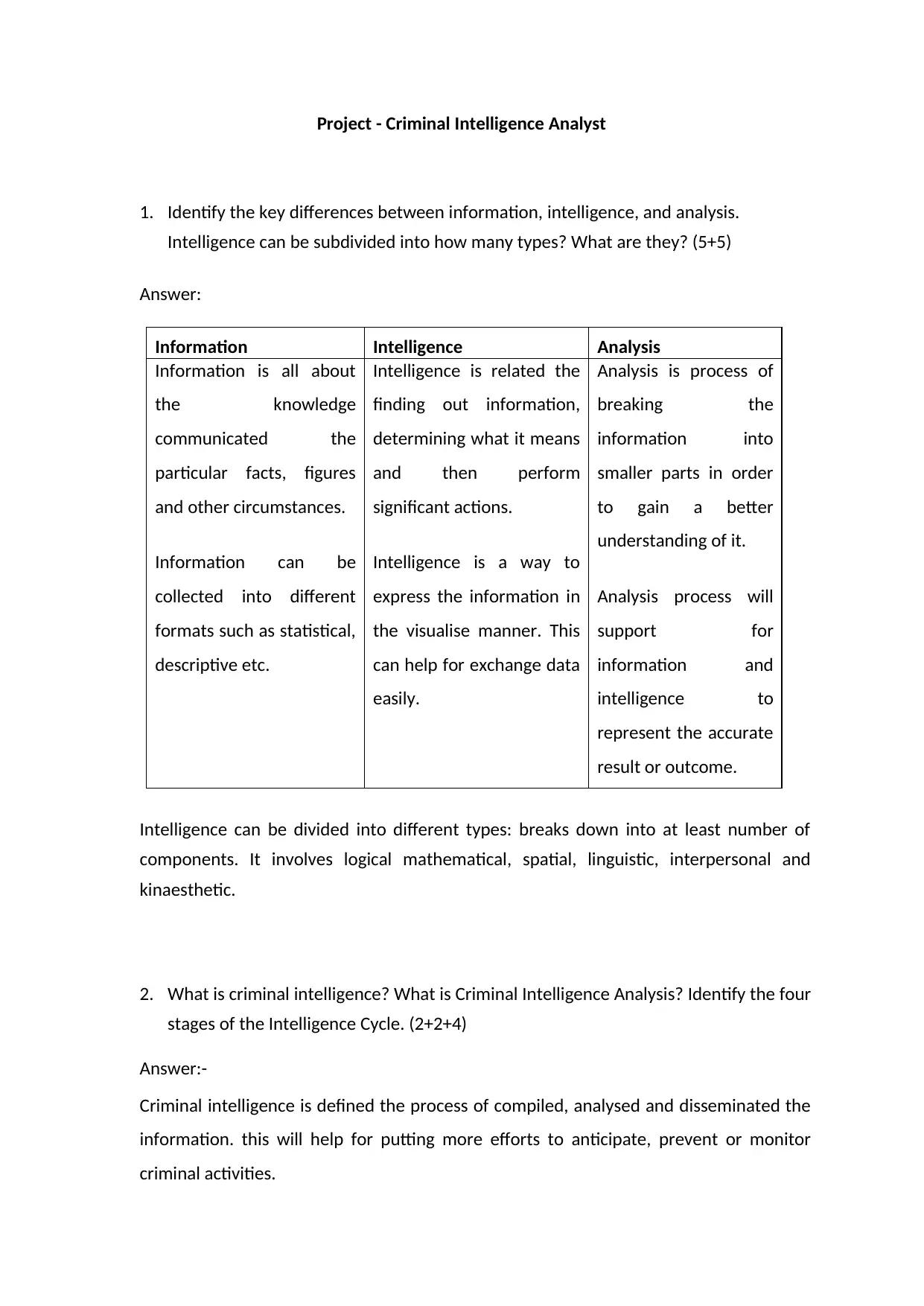
Project - Criminal Intelligence Analyst
1. Identify the key differences between information, intelligence, and analysis.
Intelligence can be subdivided into how many types? What are they? (5+5)
Answer:
Information Intelligence Analysis
Information is all about
the knowledge
communicated the
particular facts, figures
and other circumstances.
Information can be
collected into different
formats such as statistical,
descriptive etc.
Intelligence is related the
finding out information,
determining what it means
and then perform
significant actions.
Intelligence is a way to
express the information in
the visualise manner. This
can help for exchange data
easily.
Analysis is process of
breaking the
information into
smaller parts in order
to gain a better
understanding of it.
Analysis process will
support for
information and
intelligence to
represent the accurate
result or outcome.
Intelligence can be divided into different types: breaks down into at least number of
components. It involves logical mathematical, spatial, linguistic, interpersonal and
kinaesthetic.
2. What is criminal intelligence? What is Criminal Intelligence Analysis? Identify the four
stages of the Intelligence Cycle. (2+2+4)
Answer:-
Criminal intelligence is defined the process of compiled, analysed and disseminated the
information. this will help for putting more efforts to anticipate, prevent or monitor
criminal activities.
1. Identify the key differences between information, intelligence, and analysis.
Intelligence can be subdivided into how many types? What are they? (5+5)
Answer:
Information Intelligence Analysis
Information is all about
the knowledge
communicated the
particular facts, figures
and other circumstances.
Information can be
collected into different
formats such as statistical,
descriptive etc.
Intelligence is related the
finding out information,
determining what it means
and then perform
significant actions.
Intelligence is a way to
express the information in
the visualise manner. This
can help for exchange data
easily.
Analysis is process of
breaking the
information into
smaller parts in order
to gain a better
understanding of it.
Analysis process will
support for
information and
intelligence to
represent the accurate
result or outcome.
Intelligence can be divided into different types: breaks down into at least number of
components. It involves logical mathematical, spatial, linguistic, interpersonal and
kinaesthetic.
2. What is criminal intelligence? What is Criminal Intelligence Analysis? Identify the four
stages of the Intelligence Cycle. (2+2+4)
Answer:-
Criminal intelligence is defined the process of compiled, analysed and disseminated the
information. this will help for putting more efforts to anticipate, prevent or monitor
criminal activities.
Paraphrase This Document
Need a fresh take? Get an instant paraphrase of this document with our AI Paraphraser
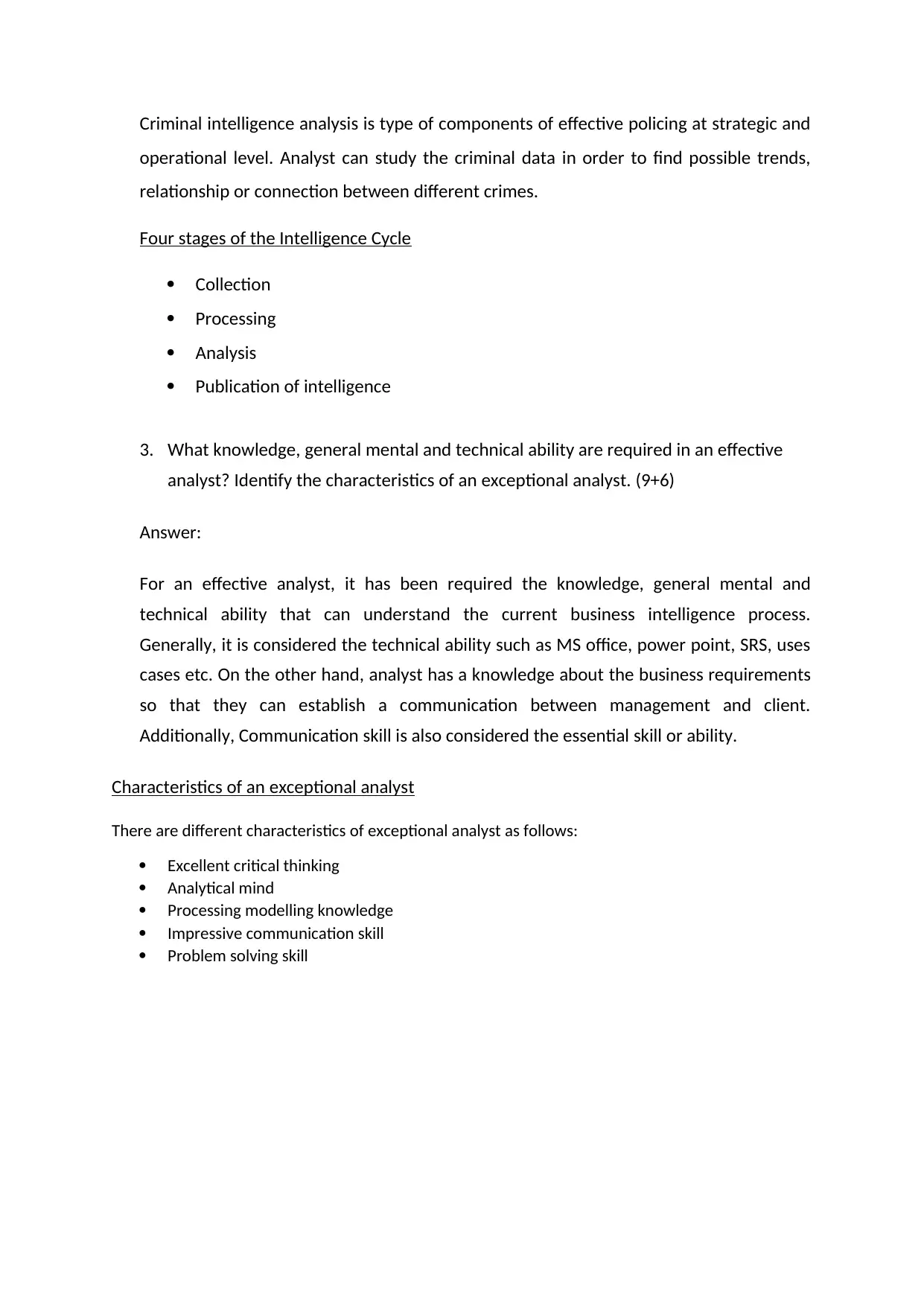
Criminal intelligence analysis is type of components of effective policing at strategic and
operational level. Analyst can study the criminal data in order to find possible trends,
relationship or connection between different crimes.
Four stages of the Intelligence Cycle
Collection
Processing
Analysis
Publication of intelligence
3. What knowledge, general mental and technical ability are required in an effective
analyst? Identify the characteristics of an exceptional analyst. (9+6)
Answer:
For an effective analyst, it has been required the knowledge, general mental and
technical ability that can understand the current business intelligence process.
Generally, it is considered the technical ability such as MS office, power point, SRS, uses
cases etc. On the other hand, analyst has a knowledge about the business requirements
so that they can establish a communication between management and client.
Additionally, Communication skill is also considered the essential skill or ability.
Characteristics of an exceptional analyst
There are different characteristics of exceptional analyst as follows:
Excellent critical thinking
Analytical mind
Processing modelling knowledge
Impressive communication skill
Problem solving skill
operational level. Analyst can study the criminal data in order to find possible trends,
relationship or connection between different crimes.
Four stages of the Intelligence Cycle
Collection
Processing
Analysis
Publication of intelligence
3. What knowledge, general mental and technical ability are required in an effective
analyst? Identify the characteristics of an exceptional analyst. (9+6)
Answer:
For an effective analyst, it has been required the knowledge, general mental and
technical ability that can understand the current business intelligence process.
Generally, it is considered the technical ability such as MS office, power point, SRS, uses
cases etc. On the other hand, analyst has a knowledge about the business requirements
so that they can establish a communication between management and client.
Additionally, Communication skill is also considered the essential skill or ability.
Characteristics of an exceptional analyst
There are different characteristics of exceptional analyst as follows:
Excellent critical thinking
Analytical mind
Processing modelling knowledge
Impressive communication skill
Problem solving skill
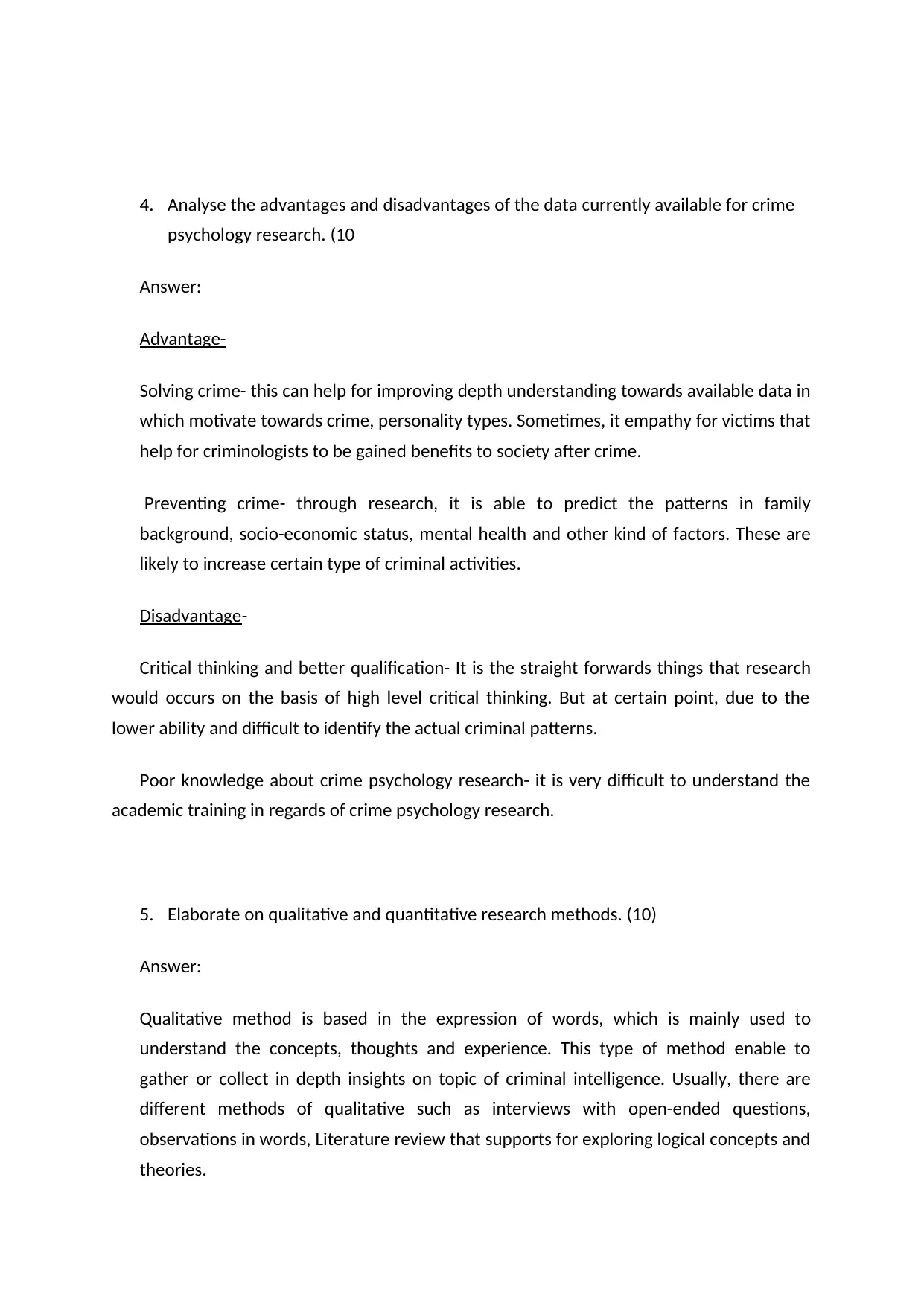
4. Analyse the advantages and disadvantages of the data currently available for crime
psychology research. (10
Answer:
Advantage-
Solving crime- this can help for improving depth understanding towards available data in
which motivate towards crime, personality types. Sometimes, it empathy for victims that
help for criminologists to be gained benefits to society after crime.
Preventing crime- through research, it is able to predict the patterns in family
background, socio-economic status, mental health and other kind of factors. These are
likely to increase certain type of criminal activities.
Disadvantage-
Critical thinking and better qualification- It is the straight forwards things that research
would occurs on the basis of high level critical thinking. But at certain point, due to the
lower ability and difficult to identify the actual criminal patterns.
Poor knowledge about crime psychology research- it is very difficult to understand the
academic training in regards of crime psychology research.
5. Elaborate on qualitative and quantitative research methods. (10)
Answer:
Qualitative method is based in the expression of words, which is mainly used to
understand the concepts, thoughts and experience. This type of method enable to
gather or collect in depth insights on topic of criminal intelligence. Usually, there are
different methods of qualitative such as interviews with open-ended questions,
observations in words, Literature review that supports for exploring logical concepts and
theories.
psychology research. (10
Answer:
Advantage-
Solving crime- this can help for improving depth understanding towards available data in
which motivate towards crime, personality types. Sometimes, it empathy for victims that
help for criminologists to be gained benefits to society after crime.
Preventing crime- through research, it is able to predict the patterns in family
background, socio-economic status, mental health and other kind of factors. These are
likely to increase certain type of criminal activities.
Disadvantage-
Critical thinking and better qualification- It is the straight forwards things that research
would occurs on the basis of high level critical thinking. But at certain point, due to the
lower ability and difficult to identify the actual criminal patterns.
Poor knowledge about crime psychology research- it is very difficult to understand the
academic training in regards of crime psychology research.
5. Elaborate on qualitative and quantitative research methods. (10)
Answer:
Qualitative method is based in the expression of words, which is mainly used to
understand the concepts, thoughts and experience. This type of method enable to
gather or collect in depth insights on topic of criminal intelligence. Usually, there are
different methods of qualitative such as interviews with open-ended questions,
observations in words, Literature review that supports for exploring logical concepts and
theories.
⊘ This is a preview!⊘
Do you want full access?
Subscribe today to unlock all pages.

Trusted by 1+ million students worldwide
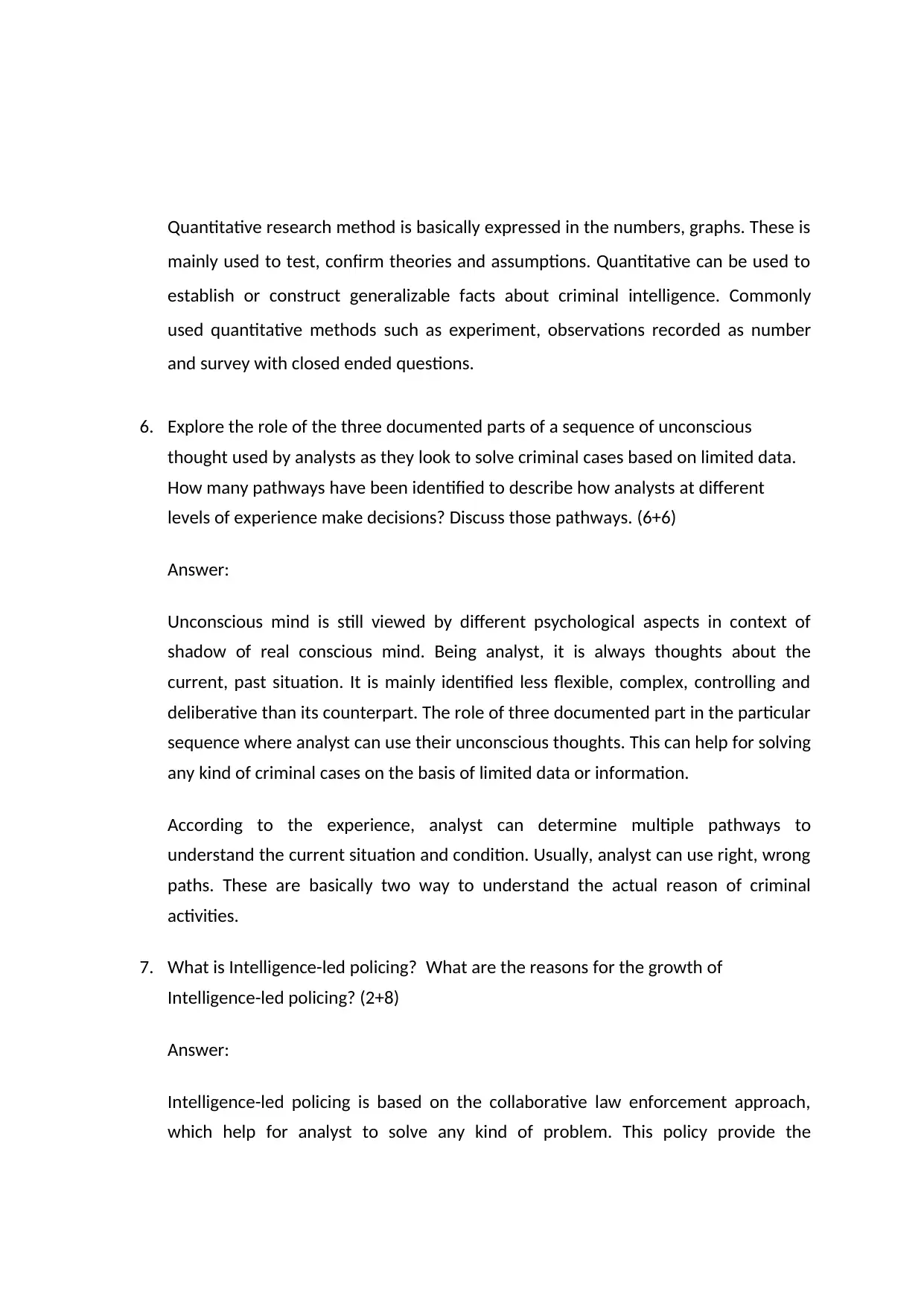
Quantitative research method is basically expressed in the numbers, graphs. These is
mainly used to test, confirm theories and assumptions. Quantitative can be used to
establish or construct generalizable facts about criminal intelligence. Commonly
used quantitative methods such as experiment, observations recorded as number
and survey with closed ended questions.
6. Explore the role of the three documented parts of a sequence of unconscious
thought used by analysts as they look to solve criminal cases based on limited data.
How many pathways have been identified to describe how analysts at different
levels of experience make decisions? Discuss those pathways. (6+6)
Answer:
Unconscious mind is still viewed by different psychological aspects in context of
shadow of real conscious mind. Being analyst, it is always thoughts about the
current, past situation. It is mainly identified less flexible, complex, controlling and
deliberative than its counterpart. The role of three documented part in the particular
sequence where analyst can use their unconscious thoughts. This can help for solving
any kind of criminal cases on the basis of limited data or information.
According to the experience, analyst can determine multiple pathways to
understand the current situation and condition. Usually, analyst can use right, wrong
paths. These are basically two way to understand the actual reason of criminal
activities.
7. What is Intelligence-led policing? What are the reasons for the growth of
Intelligence-led policing? (2+8)
Answer:
Intelligence-led policing is based on the collaborative law enforcement approach,
which help for analyst to solve any kind of problem. This policy provide the
mainly used to test, confirm theories and assumptions. Quantitative can be used to
establish or construct generalizable facts about criminal intelligence. Commonly
used quantitative methods such as experiment, observations recorded as number
and survey with closed ended questions.
6. Explore the role of the three documented parts of a sequence of unconscious
thought used by analysts as they look to solve criminal cases based on limited data.
How many pathways have been identified to describe how analysts at different
levels of experience make decisions? Discuss those pathways. (6+6)
Answer:
Unconscious mind is still viewed by different psychological aspects in context of
shadow of real conscious mind. Being analyst, it is always thoughts about the
current, past situation. It is mainly identified less flexible, complex, controlling and
deliberative than its counterpart. The role of three documented part in the particular
sequence where analyst can use their unconscious thoughts. This can help for solving
any kind of criminal cases on the basis of limited data or information.
According to the experience, analyst can determine multiple pathways to
understand the current situation and condition. Usually, analyst can use right, wrong
paths. These are basically two way to understand the actual reason of criminal
activities.
7. What is Intelligence-led policing? What are the reasons for the growth of
Intelligence-led policing? (2+8)
Answer:
Intelligence-led policing is based on the collaborative law enforcement approach,
which help for analyst to solve any kind of problem. This policy provide the
Paraphrase This Document
Need a fresh take? Get an instant paraphrase of this document with our AI Paraphraser
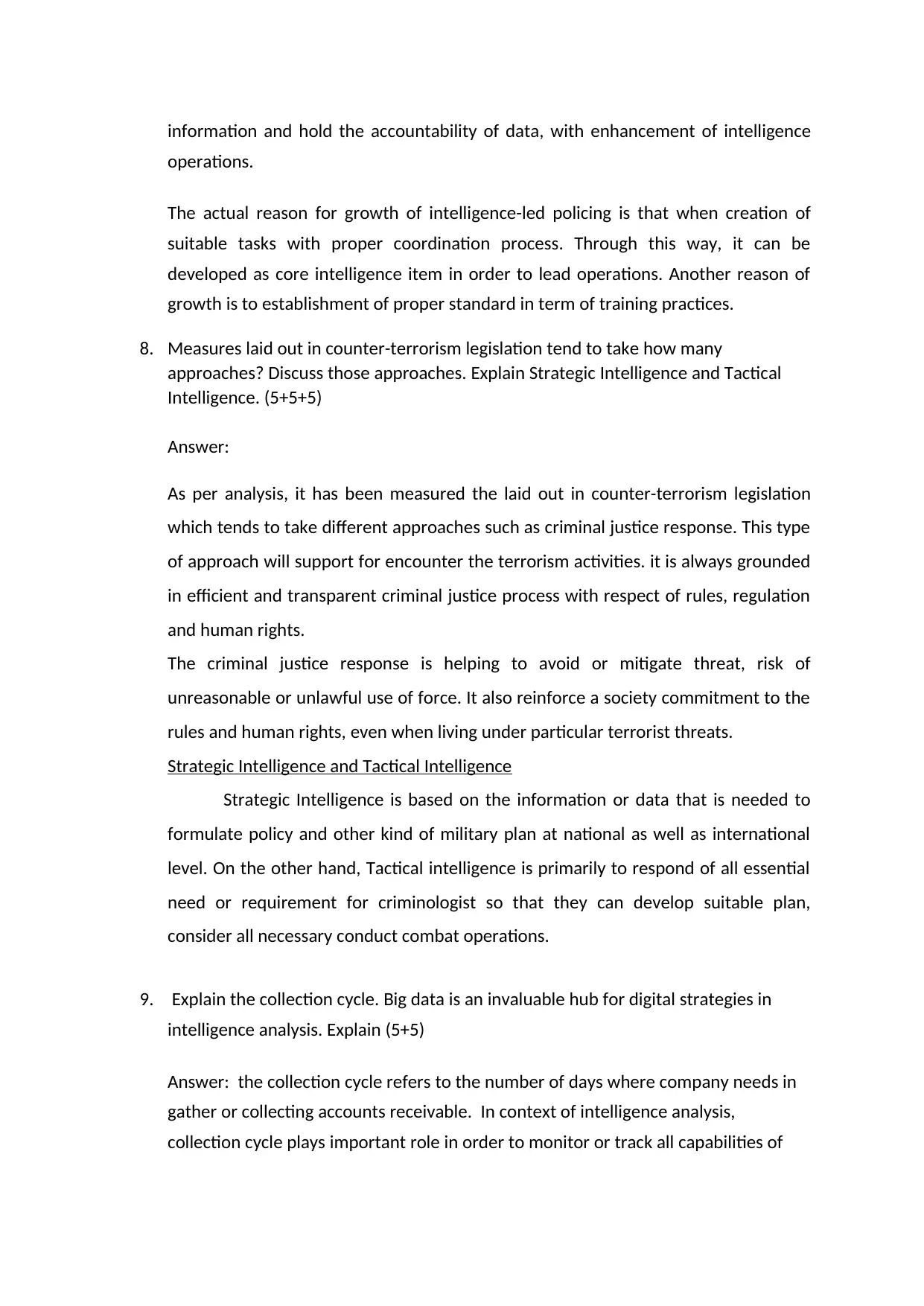
information and hold the accountability of data, with enhancement of intelligence
operations.
The actual reason for growth of intelligence-led policing is that when creation of
suitable tasks with proper coordination process. Through this way, it can be
developed as core intelligence item in order to lead operations. Another reason of
growth is to establishment of proper standard in term of training practices.
8. Measures laid out in counter-terrorism legislation tend to take how many
approaches? Discuss those approaches. Explain Strategic Intelligence and Tactical
Intelligence. (5+5+5)
Answer:
As per analysis, it has been measured the laid out in counter-terrorism legislation
which tends to take different approaches such as criminal justice response. This type
of approach will support for encounter the terrorism activities. it is always grounded
in efficient and transparent criminal justice process with respect of rules, regulation
and human rights.
The criminal justice response is helping to avoid or mitigate threat, risk of
unreasonable or unlawful use of force. It also reinforce a society commitment to the
rules and human rights, even when living under particular terrorist threats.
Strategic Intelligence and Tactical Intelligence
Strategic Intelligence is based on the information or data that is needed to
formulate policy and other kind of military plan at national as well as international
level. On the other hand, Tactical intelligence is primarily to respond of all essential
need or requirement for criminologist so that they can develop suitable plan,
consider all necessary conduct combat operations.
9. Explain the collection cycle. Big data is an invaluable hub for digital strategies in
intelligence analysis. Explain (5+5)
Answer: the collection cycle refers to the number of days where company needs in
gather or collecting accounts receivable. In context of intelligence analysis,
collection cycle plays important role in order to monitor or track all capabilities of
operations.
The actual reason for growth of intelligence-led policing is that when creation of
suitable tasks with proper coordination process. Through this way, it can be
developed as core intelligence item in order to lead operations. Another reason of
growth is to establishment of proper standard in term of training practices.
8. Measures laid out in counter-terrorism legislation tend to take how many
approaches? Discuss those approaches. Explain Strategic Intelligence and Tactical
Intelligence. (5+5+5)
Answer:
As per analysis, it has been measured the laid out in counter-terrorism legislation
which tends to take different approaches such as criminal justice response. This type
of approach will support for encounter the terrorism activities. it is always grounded
in efficient and transparent criminal justice process with respect of rules, regulation
and human rights.
The criminal justice response is helping to avoid or mitigate threat, risk of
unreasonable or unlawful use of force. It also reinforce a society commitment to the
rules and human rights, even when living under particular terrorist threats.
Strategic Intelligence and Tactical Intelligence
Strategic Intelligence is based on the information or data that is needed to
formulate policy and other kind of military plan at national as well as international
level. On the other hand, Tactical intelligence is primarily to respond of all essential
need or requirement for criminologist so that they can develop suitable plan,
consider all necessary conduct combat operations.
9. Explain the collection cycle. Big data is an invaluable hub for digital strategies in
intelligence analysis. Explain (5+5)
Answer: the collection cycle refers to the number of days where company needs in
gather or collecting accounts receivable. In context of intelligence analysis,
collection cycle plays important role in order to monitor or track all capabilities of

company and find out the logical information. all kind of essential detailed should be
gathered by using digital technology.
Big data is consider the invaluable hub in context of digital strategies at intelligence
analysis. this can support for analyst to gather large amount of data and organise in
structured format. Sometimes, marketing efforts can influence the analyst to identify
valuable information and them make better decision.
-
gathered by using digital technology.
Big data is consider the invaluable hub in context of digital strategies at intelligence
analysis. this can support for analyst to gather large amount of data and organise in
structured format. Sometimes, marketing efforts can influence the analyst to identify
valuable information and them make better decision.
-
⊘ This is a preview!⊘
Do you want full access?
Subscribe today to unlock all pages.

Trusted by 1+ million students worldwide
1 out of 6
Related Documents
Your All-in-One AI-Powered Toolkit for Academic Success.
+13062052269
info@desklib.com
Available 24*7 on WhatsApp / Email
![[object Object]](/_next/static/media/star-bottom.7253800d.svg)
Unlock your academic potential
Copyright © 2020–2026 A2Z Services. All Rights Reserved. Developed and managed by ZUCOL.





